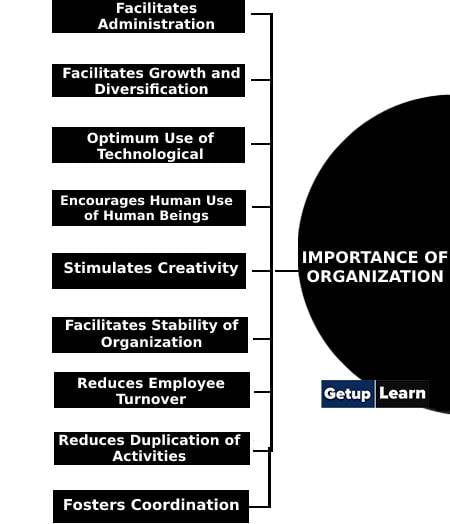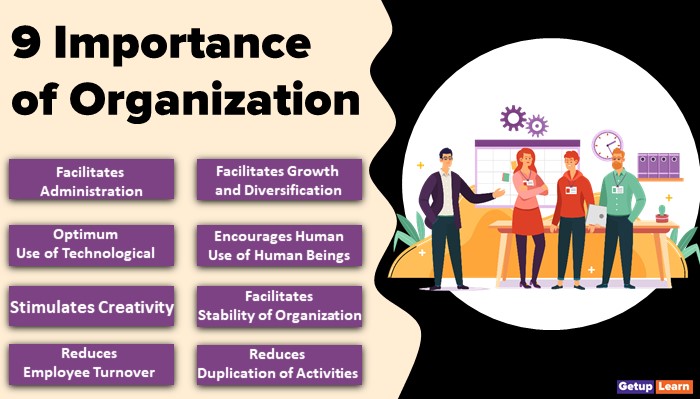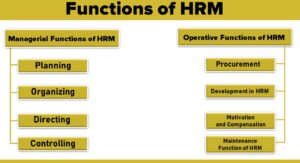Table of Contents
-
1 Importance of Organization
- 1.1 Facilitates Administration
- 1.2 Facilitates Growth and Diversification
- 1.3 Optimum Use of Technological
- 1.4 Encourages Human Use of Human Beings
- 1.5 Stimulates Creativity
- 1.6 Facilitates Stability of Organization
- 1.7 Reduces Employee Turnover
- 1.8 Reduces Duplication of Activities
- 1.9 Fosters Coordination
- 2 FAQ Related to the Importance of Organization
Importance of Organization
Organization, in its simplest sense, means a form of human association for the attainment of common objectives. Sound organization is quite essential for every enterprise, Organised thoughts have always been the basis of organized actions.
Without sound organization, no management can manage the various operations of the enterprise. Obviously, the better the organization, the fuller would be the achievement of the common objectives and similarly, a loose organization of an enterprise implies a dangerous state of affairs.
The importance of organization can be clearly understood from the statement of Kenneth C Towe.
According to him, “A sound form of organization is the answer to every business problem, that a poor organization could run a good product into the ground and that a good organization with a poor product could run a good product out of the market.
Let’s discuss the importance of organization explained below:
- Facilitates Administration
- Facilitates Growth and Diversification
- Optimum Use of Technological
- Encourages Human Use of Human Beings
- Stimulates Creativity
- Facilitates Stability of Organization
- Reduces Employee Turnover
- Reduces Duplication of Activities
- Fosters Coordination

Facilitates Administration
A properly designed and balanced organization facilitates both management and operation of the enterprise. It increases management’s efficiency and promptness, avoids delay and duplication of work, and motivates employees to perform their job efficiently.
By proper division of labor, consistent delegation and clear job definition, the organization structure siphons off the routine duties and makes them the responsibility of lower-rated positions.
Facilitates Growth and Diversification
The organization structure is the framework within wiuch the company grows. The organization structure should provide for the expansion and diversification of the enterprise otherwise, the enterprise will find itself in a serious administrative crisis. Thus, the organization facilitates the growth and diversification of the enterprise.
Optimum Use of Technological
Provides for Optimum use of Technological Improvements: A sound organization structure facilitates the optimum use of technological improvements like computer systems etc. The high cost of installation, operation, and maintenance of such equipment calls for proper organization.
Encourages Human Use of Human Beings
A sound organization provides for efficient selection, training, and development of staff, job rotation, and job enlargement. The organizational structure can profoundly affect the people of the company. The proper organization facilitates the intensive use of human capital.
Stimulates Creativity
Organization stimulates creativity. By providing well-defined areas of work and ensuring delegation of authority, the organization provides sufficient freedom to the managers and encourages their initiative, independent thinking, and creativity.
Facilitates Stability of Organization
By ensuring delegation of authority, two-way communication, cooperation, effective leadership, employee morale, and flexibility to adjust to changes in the conditions, a sound organization facilitates the stability of the organization.
Reduces Employee Turnover
Organization increases employee satisfaction ensures better relations between the management and the workers, and thereby reduces employee turnover.
Reduces Duplication of Activities
The organization avoids delay and duplication of activities and consequent confusion by ensuring well-defined responsibilities and authority.
Fosters Coordination
By providing the framework for holding together the various functions in an orderly pattern, the organization fosters coordination.
What is the importance of organization?
Following is the importance of organization given below:
1. Facilitates Administration
2. Facilitates Growth and Diversification
3. Optimum Use of Technological
4. Encourages Human Use of Human Beings
5. Stimulates Creativity
6. Facilitates Stability of Organization
7. Reduces Employee Turnover
8. Reduces Duplication of Activities
9. Fosters Coordination.














